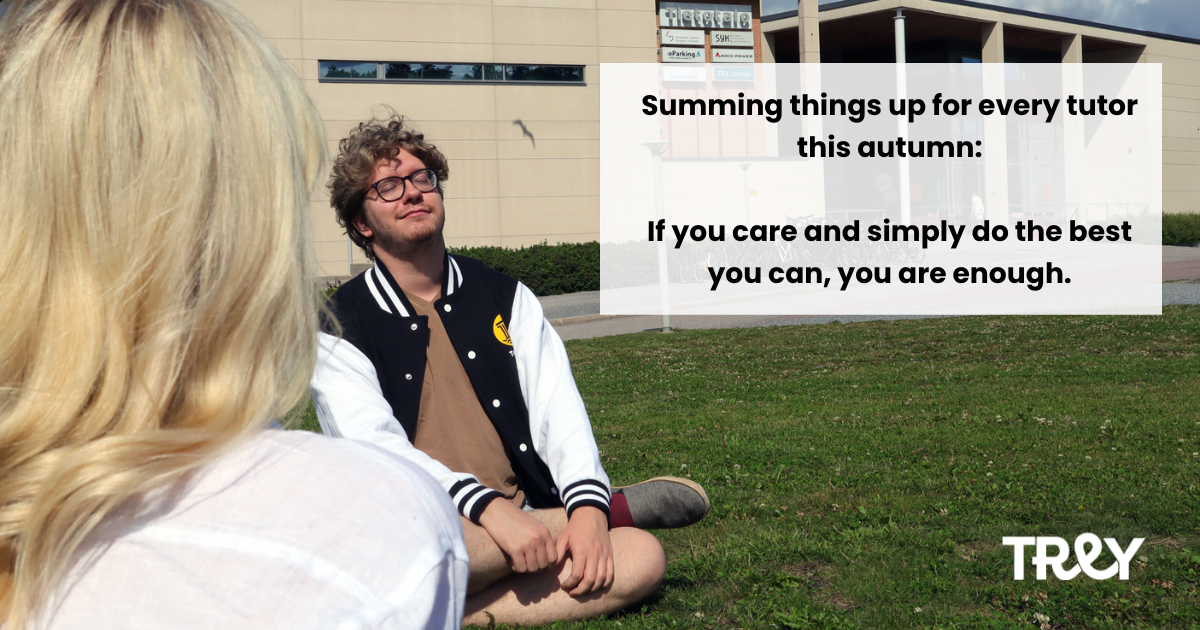While I’m sitting in my lunch table in Reaktori, I can munch on some macaroni casserole and gaze out to Etunurtsi that still looks so deserted. A quick peek into my calendar, however, reminds me that quite soon, in just a couple of weeks, the campuses and city streets will once again be filled with student life as over three thousand new freshers begin their higher education studies in Tampere. In addition to them, hundreds of exchange students from around the world arrive for a shorter or longer stay in Finland, so there are definitely a plenty of new faces at the university.
To support all of these new students, over a thousand volunteering peer tutors have been selected and trained during the spring for the upcoming autumn. The Student’s Guide of Tampere University describes the role of a tutor as follows: ”The job of a tutor is to help you in adjusting to the university life in Tampere and to get off to a good start with your studies. Your tutors can help you with getting to know the campuses and student life and they can offer you practical advice and support for studying at the university or e.g. regarding the Finnish culture.” Doesn’t sound like a big deal – as long as the freshers and exchangees find their place in this nearly 20 000 member student community and quarter-million inhabitant city, the tutors have done their job alright.
When you describe tutoring like this, it does suddenly sound so big and daunting with its goals, doesn’t it? I’ve acted as a tutor organiser in my own subject association for three rounds over the years, and every single time I’ve seen tutors pay immense heart and mind to their task. It warms my heart so much, but there are of course downsides too. Because you want to survive through tutoring with honor, you easily set yourself some massive objectives and then try to reach them with great vigor. That’s when you might end up questioning your ability and capability. What if I don’t know the answers to all Sisu-related questions? What if my freshers don’t become the best of friends during the orientation week already? What if no one comes to our tutor group’s lunch session? Does that make me a bad tutor? (Spoiler alert for a few rows downward: it does not.)
Usually these self-reflective questions come from the tutors who are just starting out their second study year, i.e., they are freshers from the previous year. The questions stem from the insecurity that is born quite naturally in the middle of this complex organisation called ”the university”. There are constantly things happening everywhere around you, and you don’t understand anything about them after a year – or, in my case, even after six years – and that easily gives you a crushingly baffled feeling. At that point, it can be challenging to notice the changes that have happened in your understanding and readiness-to-act compared to the person who you were when you first started uni. But the truth is that you, as a tutor, have been trained, you receive support and you will be perfectly fine with your tutees. Summing things up for every tutor this autumn:
If you care and simply do the best you can, you are enough.

While I’m sitting in my lunch table in Reaktori, I can also peer back to the lunch line. Quite soon there’ll be a group of freshers there led by tutors who tell them how to get student-priced food by flashing your shiny new student card at the cash register. Thank you for being one of these people who help guide new freshers and exchange students.
The author is TREY’s Specialist in Tutoring Teemu Juutilainen who has seen more tutoring than a single individual probably ever needs to.